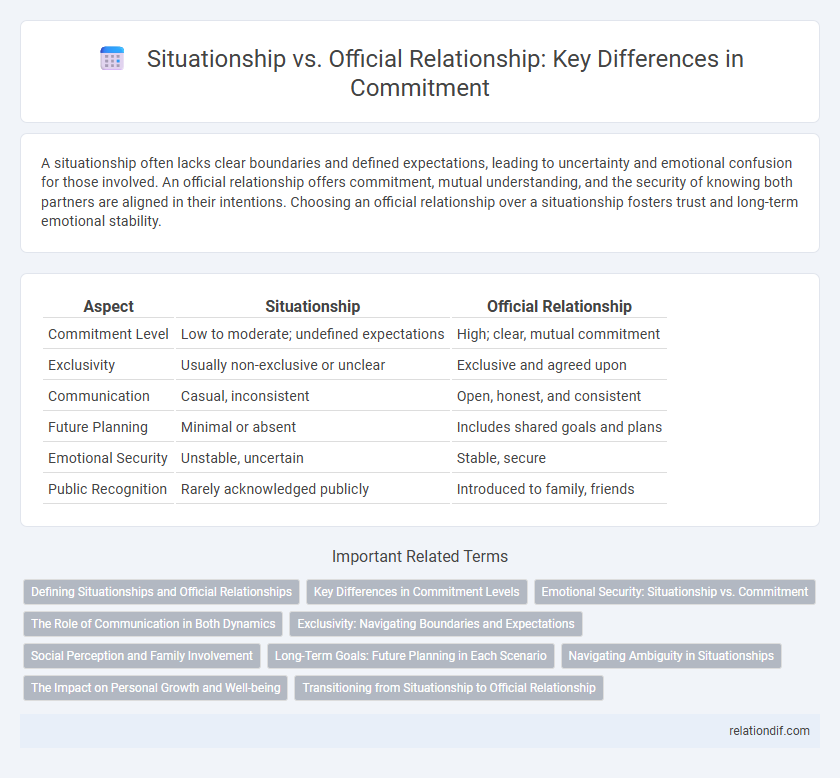A situationship often lacks clear boundaries and defined expectations, leading to uncertainty and emotional confusion for those involved. An official relationship offers commitment, mutual understanding, and the security of knowing both partners are aligned in their intentions. Choosing an official relationship over a situationship fosters trust and long-term emotional stability.
Table of Comparison
| Aspect | Situationship | Official Relationship |
|---|---|---|
| Commitment Level | Low to moderate; undefined expectations | High; clear, mutual commitment |
| Exclusivity | Usually non-exclusive or unclear | Exclusive and agreed upon |
| Communication | Casual, inconsistent | Open, honest, and consistent |
| Future Planning | Minimal or absent | Includes shared goals and plans |
| Emotional Security | Unstable, uncertain | Stable, secure |
| Public Recognition | Rarely acknowledged publicly | Introduced to family, friends |
Defining Situationships and Official Relationships
Situationships are ambiguous connection types lacking clear commitment, often characterized by inconsistent communication and undefined expectations. Official relationships feature explicit mutual agreement, emotional investment, and long-term commitment goals. Defining these distinctions helps individuals understand their emotional boundaries and relationship intentions.
Key Differences in Commitment Levels
Situationships typically lack clear commitment, characterized by ambiguity and flexibility in emotional or future plans, whereas official relationships involve explicit agreements and mutual understanding of exclusivity and long-term intentions. Commitment levels in official relationships often include shared responsibilities and emotional investment, creating a stable foundation compared to the uncertain dynamics of situationships. The clarity in expectations and mutual dedication in official relationships sets a distinct boundary absent in most situationships.
Emotional Security: Situationship vs. Commitment
Emotional security in a situationship often feels uncertain, as the lack of clear boundaries and labels creates ambiguity about mutual expectations and future intentions. In contrast, commitment fosters a consistent sense of trust and reassurance, allowing partners to build a stable foundation grounded in open communication and shared goals. This security reduces anxiety and enhances emotional intimacy, making it easier to navigate challenges and deepen the connection.
The Role of Communication in Both Dynamics
Effective communication forms the foundation of both situationships and official relationships, yet its role differs significantly in each dynamic. In situationships, communication often remains ambiguous, lacking clear expressions of intent and emotional transparency, which can lead to confusion and unmet expectations. Official relationships rely on consistent, open dialogue to establish trust, set boundaries, and navigate shared goals, reinforcing commitment and emotional connection.
Exclusivity: Navigating Boundaries and Expectations
Exclusivity in situationships often remains ambiguous, causing confusion about boundaries and mutual expectations. Official relationships clearly define commitment through mutual agreement, establishing firm boundaries that foster trust and emotional security. Understanding these distinctions helps individuals navigate personal expectations and communicate limits effectively.
Social Perception and Family Involvement
Situationships often face social skepticism due to their ambiguous commitment, leading to limited family acceptance and involvement. Official relationships, recognized openly, tend to receive greater social validation and active participation from family members. This societal endorsement reinforces emotional security and long-term stability within the partnership.
Long-Term Goals: Future Planning in Each Scenario
Long-term goals in a situationship often remain undefined or vague, limiting future planning and creating uncertainty about shared aspirations. Official relationships typically involve explicit discussions about future milestones such as career growth, family planning, and financial stability, fostering alignment and mutual commitment. Clear communication of long-term objectives strengthens commitment and supports sustained growth in official partnerships.
Navigating Ambiguity in Situationships
Navigating ambiguity in situationships requires clear communication and an honest assessment of mutual expectations to avoid emotional confusion. Unlike official relationships, situationships lack defined boundaries, leading to misunderstandings about commitment levels and future intentions. Prioritizing transparency helps both partners align their desires and prevent the pitfalls of uncertainty.
The Impact on Personal Growth and Well-being
Situationships often create emotional ambiguity that hinders personal growth by limiting clarity in expectations and future planning. Official relationships provide defined boundaries and mutual commitment, fostering stability and enhancing emotional well-being. Clear commitment supports self-esteem and long-term mental health, while situationships may cause stress and emotional exhaustion.
Transitioning from Situationship to Official Relationship
Transitioning from a situationship to an official relationship requires clear communication of mutual expectations and emotional boundaries. Consistent efforts to build trust and demonstrate commitment help solidify the relationship's foundation. Establishing defined labels and shared future goals marks a critical shift toward a serious partnership.
situationship vs official relationship Infographic

 relationdif.com
relationdif.com